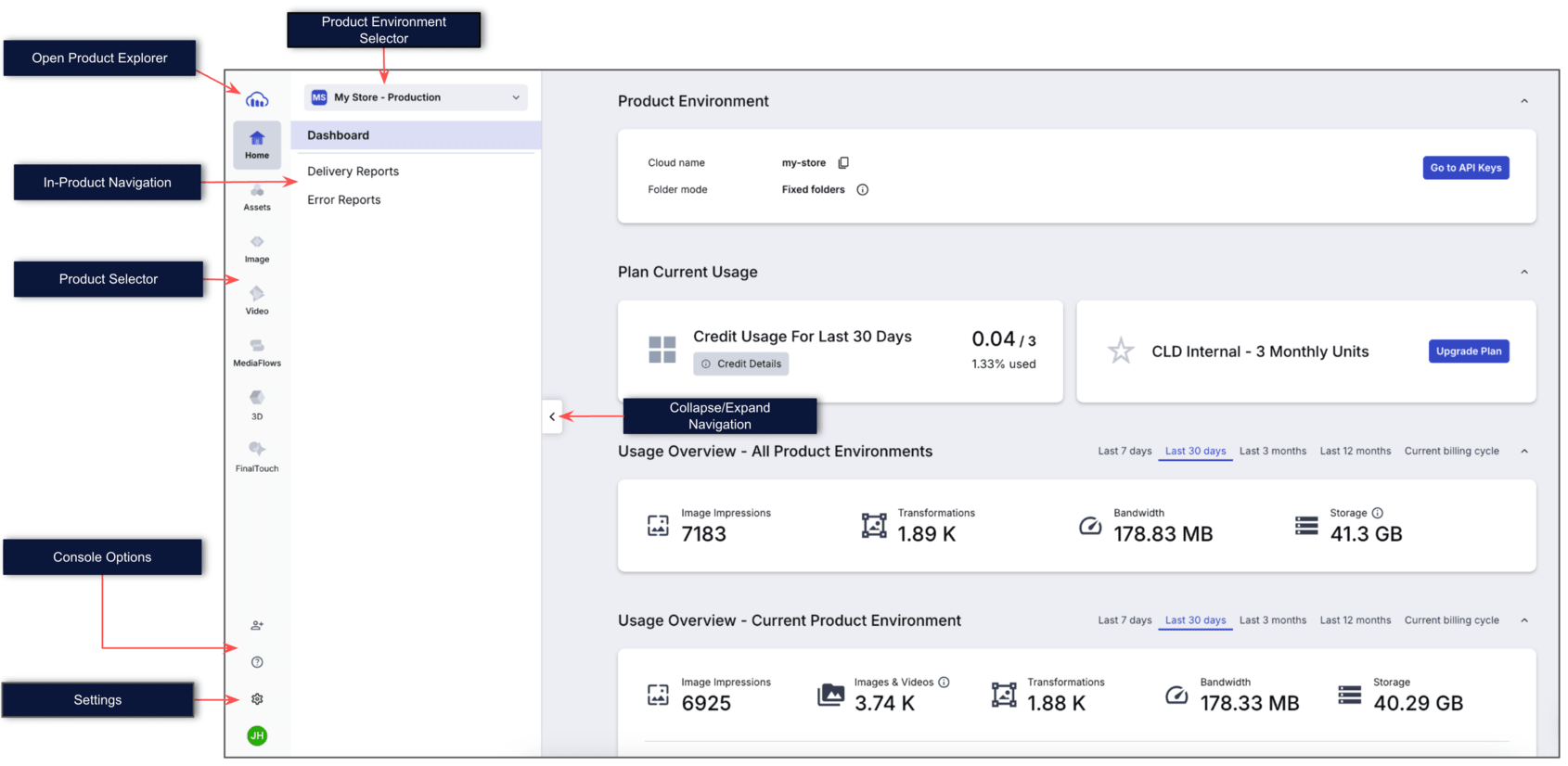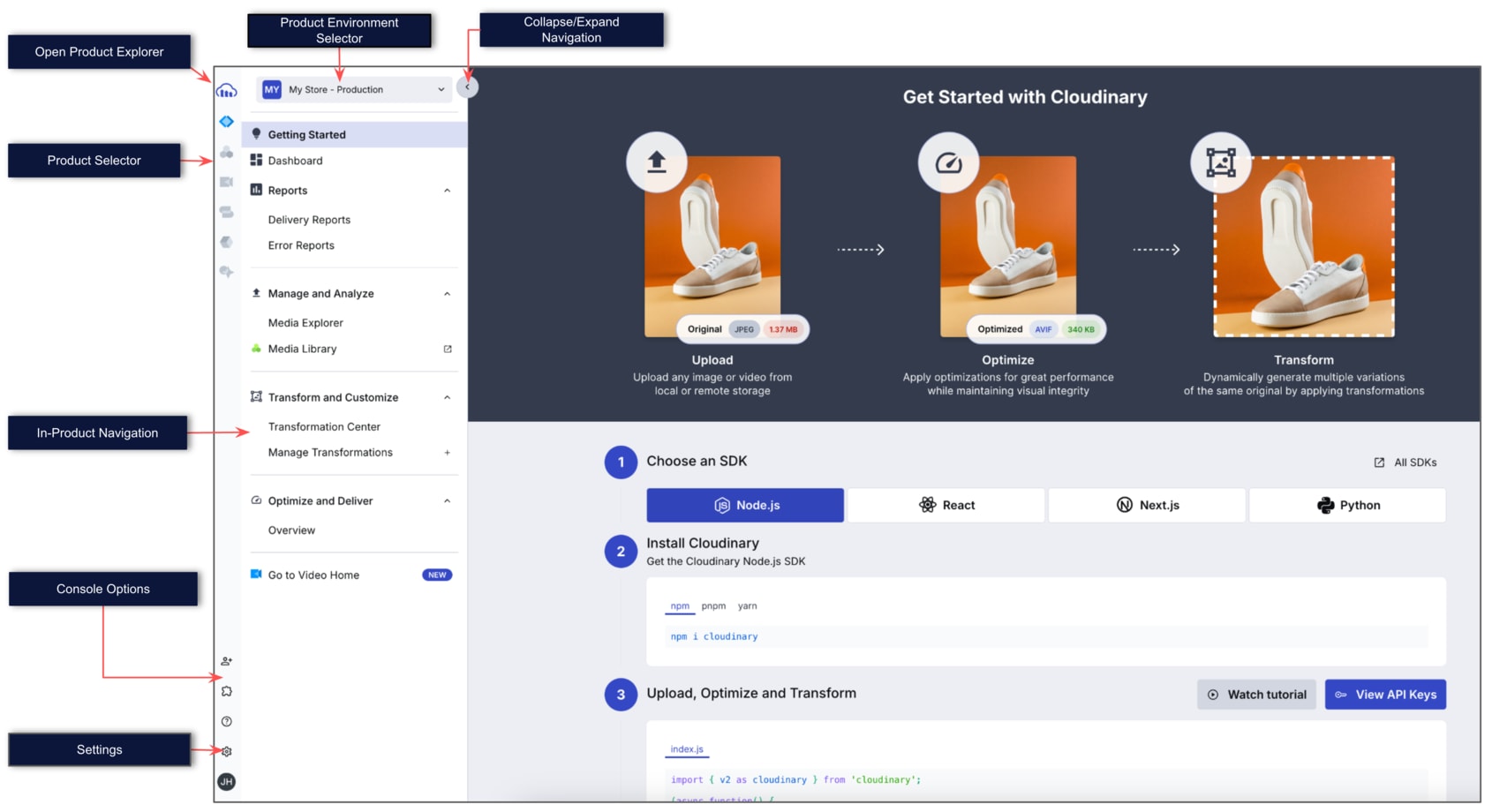Cloudinary Image & Video release notes: May 27, 2025
Last updated: May-27-2025
We publish Cloudinary Image and Video API release notes periodically to give you a quick overview of all the new features, enhancements, and fixes that we've recently released for Cloudinary developers. When relevant, they may also give sneak previews of upcoming features and/or other share important announcements.
Cloudinary Image
Improved background removal, no add-on required
You can now remove image backgrounds without the need to register for an external add-on or purchase separate add-on quotas.
- Supports up to 6000×6000 pixel originals
- Faster processing eliminates 423 timeout errors on first request
- You can use it anywhere in transformation chains (no longer restricted to the first transformation in the chain)
If you're already using Cloudinary's background removal, you don't have to change anything in your code as the API and transformation syntax and responses haven't changed.
However, note that if you have an active subscription for the Cloudinary AI Background Removal add-on, that continues to be used. To start using the improved, built-in background removal, end your subscription, and the relevant transformation counts will be applied in place of using add-on quotas.
PDF optimization (Beta)
Apply q_auto to PDFs for automatic compression and optimization. This reduces file sizes for catalogs, brochures, and media-rich documents while maintaining visual clarity.
- Currently supports PDF files up to 10 pages or 5 MB.
- To participate in the Beta, open a support request or contact your CSM.
Additional image enhancements
HDR → SDR tone mapping
When you upload an HDR (High Dynamic Range) image original, Cloudinary automatically converts it to an SDR image before delivering it. This conversion now better preserves contrast and subtle details in highlights and shadows, ensuring more vibrant and true-to-intent image rendering on standard displays.
Google logo detection with async support in Analyze API
Detect common logos in your media assets with the Analyze API, including asynchronous processing for better scalability with large image volumes.
Use region count and region names in conditional transformations
Build dynamic conditional transformations based on detected region count (rc) or names (rn). This enables you to create logic-based transformations based on specific focus areas.
Incoming generative AI transformations
Until now, you could perform your generative AI transformations eagerly or on-the-fly. Now you can also apply them as incoming transformations to normalize the assets you store in Cloudinary. This unlocks additional workflow automations incorporating background generation, smart fills, or object adjustments.
Learn more about generative AI transformations
Cloudinary Video
New Video Home in the Cloudinary Console
The Console now features a dedicated Video section with a unified Video Home landing page for streamlined workflows.
Upload and edit videos, build players, inspect engagement metrics, and view recent uploads all in one place.
WCAG 2.1 AA compliant video player
The Cloudinary Video Player now meets full WCAG 2.1 AA compliance with:
- Enhanced keyboard navigation, captions, transcripts, and multi-language tracks
- Compliance with global accessibility standards (EAA, ADA)
New Live Streams and Live Streams Health Monitor UIs
Manage live video streams in the new Live Streams interface. Create, start, monitor, and control live events with ease.
After you deliver a live stream, take advantage of the new Live Stream Health Monitor for real-time performance insights and stability monitoring for active input streams. Proactively identify issues before they impact viewers. You can access Live Stream details via API as well.
Auto-translate video transcripts via API or UI
Automatically translate video transcripts into multiple languages via API or directly in the Video Player Studio Transcript Editor. Perfect for scaling localized content and improving accessibility.
Additional video enhancements
Video Player Studio improvements
- CNAME & custom subdomain support: Dynamic configuration based on the currently selected product environment.
- All delivery types supported (upload, private, authenticated): Seamless preview for video content, transcripts, chapters, and profiles.
Audio enhancements
-
pcm_s24le codec for .WAV streams: Enable this codec by adding the new
ac_pcm24transformation to your URL (otherwise,pcm_s16leis applied by default) -
Independent video/audio bitrate control: For example, set a video bitrate of 2M, while applying an audio bitrate of 128k:
br_av:video_(rate_2M;mode_cbr);audio_(rate_128k)
Auto streaming profile (sp_auto) with 2K and 4K support
Stream 4K and 2K content using the sp_auto transformation in HLS or DASH (no upscaling).
Populate the text value or color of video text overlays with variables
You can now specify the text value or color for your video text overlays using user-defined variables.
Asset and account management
New folder search API
Use the new folders/search endpoint to find folders by search expression. Search by name, path, created_at, updated_at, or folder id using the same syntax as the resources search API.
For example, you could search for folders that include folder in the folder's name, the full folder path includes my_parent, and was created in the past for weeks: "expression": "name:folder AND path:my_parent AND created_at>4w",
Increased webhook endpoint limits
You can now define webhook triggers up to a maximum determined by multiplying the number of unique event types by the limit of 30 notification URLs (up from 10 notification URLs) in each product environment. You can do this in the Webhook Notifications page in the Console or programmatically.
Asset operations by asset ID
You can now destroy, delete, update, or restore assets by asset_id (REST API only). You can use these new endpoints as an alternative to the existing endpoints for performing the same operations by public_id.
Learn more: Destroy by asset ID | Delete by asset ID | Update by asset ID | Restore by asset ID
Larger eval function payloads
The upload eval parameter now supports payloads larger than 4095 characters. To reference the larger payload securely during uploads, rather than passing the JavaScript as a code string, store your JavaScript as a raw, authenticated file and reference it by setting: #RESOURCE_REF:<public_id> as the eval value.
Domain blocking for account registrations
Enterprise customers can now prevent users from registering new private accounts using their organization's email domain. This helps ensure all users are properly added to the main account. To enable this feature, contact your Customer Success Manager.
New Upload Widget changelog
You can now see and get notifications on all Upload Widget releases, including version number, release date, and details of the changes.
Documentation
'Ask Cloudinary AI' assistant in the Doc site
Have you tried the Ask Cloudinary AI assistant yet? It regularly re-trains on the latest docs, knowledge-base articles, training courses, and more, so it's a great way to quickly find out how to write code, what the best features are for your use case, to point you to Console UI options, or whatever else you'd like help with.
Ask questions in your preferred language and the AI assistant always answers you in the same language! Don't forget to rate the answers or leave text feedback, so we can make sure it keeps getting better.
You can find the Ask Cloudinary AI button at the top of this and every documentation page near the Search bar.
New 'Retail and e-commerce' use-case guide
Shaped by our own customer's insights, this new highly visual, example-packed Retail and e-commerce use-case guide shows how you can get the most out of Cloudinary for your retail and e-commerce workflows.
This extensive guide covers:
- Best practices for e-commerce media management
- Delivery channels such as websites, mobile apps, social media, and third-party stakeholders
- Visual differentiators that drive engagement and strengthen branding
- Product and non-product asset workflows
Announcements
New Console experience
A new Console Experience was recently launched. Depending when your account was created, you may have the new App Console or the Classic Console.
- Some accounts created on or after Apr-23-2025 have the new App Console.
In this version, the first item on the left navigation, below the Cloudinary logo, is the Home node. - All accounts created prior to Apr-23-2025 have the Classic Console.
In this version, the first item on the left navigation, below the Cloudinary logo, is the Programmable Media node.
Over the course of the coming quarters, all accounts will gradually migrate to the new App Console.
App Console (new):
Classic Console:
Media Explorer deprecation
If you created your account after March 31, 2025, your Console doesn't include the Media Explorer. We'll also be gradually removing the Media Explorer UI from existing accounts between May 1 and July 31, 2025.
The Media Library offers similar functionality for managing assets via the Console UI. For details, see Media Library for developers.
Cloudinary Dimensions renamed to Cloudinary 3D
Cloudinary 3D (formerly Dimensions), brings 3D content into the Cloudinary platform you already know and trust.
Select the 3D product in your Cloudinary Console to start uploading, storing, and managing your 3D assets, with Cloudinary as your single source of truth, making content creation faster and easier to scale.
Use our API-first platform to generate photorealistic pack shots, lifestyle images, videos, interactive 3D viewers, configurators, and AR experiences from 3D files, with no 3D expertise required.
Register for notifications
Make sure you always know when we publish new release notes with the Image and Video release notes RSS feed:
Grab this RSS link to watch for new Image and Video release notes in your favorite RSS reader.






